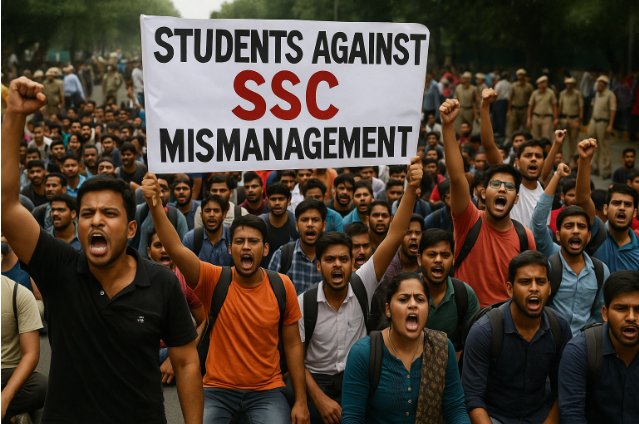
The mismanagement surrounding the Staff Selection Commission's (SSC) Phase 13 Selection Post examination has led to a significant and widespread protest. Thousands of hopeful candidates and SSC educators have taken to the streets of Delhi to voice their concerns. Many candidates across the country faced abrupt changes in their exam centres without notice, exam cancellations, and various technical issues. This mismanagement has prompted candidates and educators to question the integrity of the system.
The 'Delhi Chalo' Campaign
While the act of injustice is undoubtedly grave, remaining silent in its face can be even more harmful. The 'Delhi Chalo' campaign represents a bold effort to challenge the systemic issues at hand and to recognise the suffering endured by students and educators facing these inhumane circumstances. The students and teachers assembled at Jantar Mantar with a genuine and reasonable request for reforms, accountability, and an inquiry into the system's inefficiencies. Nevertheless, they were brutally beaten and detained by the police. Is this what it means to safeguard freedom of speech? Is this how we honour democracy?
What is SSC?
SSC, or the Staff Selection Commission, is an Indian organisation responsible for conducting examinations for multiple positions within various departments and ministries. Some of the key exams it oversees include SSC CGL, SSC GD, and SSC JE. This organisation plays a crucial role in the government sector, as around 2 to 3 million students annually register for its exams. Consequently, the employment opportunities and livelihoods of countless individuals hinge on the outcomes of these assessments, where even a minor error can have significant repercussions on a person's life. The authorities are not just overseeing an exam; they hold the responsibility for actual human lives. No error can be tolerated, no matter how minor. At the same time, countless hopeful candidates are voicing their complaints, pointing out the authorities' negligence. Both the candidates and teachers are rallying to demand that a government body carry out its responsibilities. This situation is certainly worrying. Has our nation's system truly fallen to this point?
Inquiry is a Fundamental Aspect of Democracy
Democracy allows for the right to question. Educators and students are advocating for organised reforms to ensure fair, transparent, and efficient management of recruitment examinations. This is a reasonable request. However, instead of acknowledging their shortcomings and initiating an investigation, students and teachers are being treated unfairly. It is undeniably disheartening that these government organisations show no regard for students who sacrifice their most valuable and productive years for these exams.
Reasons for the Protest
Reports from reputable newspapers indicate that the main issue driving the protest is ineffective administration and technical issues occurring at numerous exam centres. Many candidates have raised concerns about malfunctioning systems, server crashes, and defective keyboards and mice. Additionally, they have reported that the exam portal became unresponsive partway through the exams. They also expressed their concerns about the unreasonable distribution of exam centres. After travelling over a thousand kilometres, the exam was unexpectedly cancelled. Reports indicate that officials have acknowledged receiving over fifty thousand complaints. This reflects the shortcomings of the system.
Demands of the Protesters
The protesters are seeking justice, transparency, and answers. The students have suffered significant losses in terms of finances, effort, and, most critically, valuable years of their lives. They are calling for accountability and are requesting that exams be conducted fairly. Students are requesting that the authorities address these issues.
In recent times, there have been significant issues extending beyond just the SSC, affecting various government examinations as well. These include instances of cheating scandals, paper leaks, and numerous exam cancellations. Rishi Shukla, a law research scholar from Lucknow who has assisted in numerous legal petitions against the National Testing Agency (NTA), remarked, "The NTA has a single responsibility: to conduct exams, and it has failed miserably." His comments are relevant to other organisations responsible for administering government exams as well. The dedicated students who devote countless hours to their studies, sacrificing their time and health for a single exam filled with aspirations—what they often receive in return is a re-test, along with feelings of despair and disappointment.
The entire examination process warrants scrutiny. Is this truly how they value time? Is this the way they regard the lives of their citizens? The negligence of the authorities should not lead to a loss of time for students. We require robust reforms and stringent regulations. Students, teachers, and parents should not accept these inefficiencies in the national examination system. We don't wish for films or dramas that take inspiration from these narratives. The pressure of striving for success can feel like being trapped in a pressure cooker. The mental anguish they endure is beyond comprehension. The pattern of mismanagement continues relentlessly. Is there any solution to this? Whether it's SSC, NEET, UGC NET, or CTET, some form of mismanagement is inevitable.
The Lok Sabha has approved the Public Examination Bill 2024, aimed at curbing misconduct in recruitment exams such as UPSC, SSC, and various entrance tests, including CUET, NEET, and JEE. However, is the passage of this bill sufficient? What about ensuring fair implementation and ongoing oversight? Why isn’t there consistent inspection and accountability in place?
While it’s simple to claim that young people represent the country’s future, genuinely hearing their voices, safeguarding their aspirations, and allowing them to advocate for themselves is more challenging. Is society prepared to permit them to envision a future beyond these government tests? As a nation, are we ready to challenge the system?
